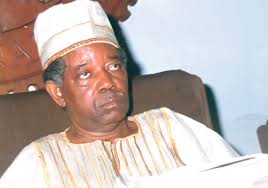Babá re lé ò,
Ilé ló lọ́ tarà-rà
Bàbá re lé ò,
Ilé ló lọ́ tarà-rà
Ilé ò, ilé, Ilé ò, ilé,
Babá re lé ò,
Ilé ló lọ́ tarà-rà
Ni Àṣà Yorùbá, ọmọdé ló nkú, àgbà ki kú, àgbà ma nrelé ni. Ọ̀fọ̀ ni ikú ọmọdé jẹ́, ijó àti ilú ni wọn fi nṣe ìsìnku àgbà lati sín dé ilé ikẹhin. Ìròyìn ikú Ọj̀ọ̀gbọ́n-Àgbáyé Adé Àjàyí kàn lẹhin ikú rẹ ni ọjọ́ kẹsan, oṣù kẹjọ,ọdún Ẹgbã-le-mẹrinla. A bi ni ilú Ìkọ̀lé-Èkìtì ni ọdún marun-le-lọgọrin sẹhin. Ọ̀pọ̀lọpọ̀ Ọ̀jọ̀gbọ́n, ọmọdé àti àgbà ilú lati onírúurú iṣẹ́àti àwọn èniyàn pàtàki ni ilé-lóko péjọ ni ọjọ kọkàn-din-logun, oṣù kẹsan,ọdún Ẹgbã-le-mẹrinla lati ṣe ìsìnku rẹ.
http://www.ngrguardiannews.com/news/national-news/179784-eulogies-as-eminent-scholar-ade-ajayi-is-buried
Ọ̀rọ̀ Yorùbá sọ pé “Ẹni ti kò bá mọ ìtàn ara rẹ, yio dahun si orúkọ tí kò jẹ́”. Ki awọn bi Olóògbé tó bẹ̀rẹ̀ si kọ Ìtàn Yorùbá àti ilẹ́ Aláwọ̀-dúdú silẹ̀, àwọn Aláwọ̀-funfun kò rò pé Aláwọ̀-dúdú ni Ìtàn nitori wọn kò kọ silẹ̀, wọn nsọ Ìtàn lati ẹnu-dé-ẹnu ni. Nitori eyi, ohun ti ó wu Aláwọ̀-funfun ni wọn nkọ. Olóògbé Ọj̀ọ̀gbọ́n-Àgbáyé Adé Àjàyí, kọ́ ẹ̀kọ́, ó si gboyè rẹpẹtẹ lori Ìtàn, pàtàki lati jẹ́ ki Yorùbá mọ ìtàn ara wọn. Ó lo imọ̀ yi lati kọ ọ̀pọ̀lọpọ̀ iwé itan, ikan lára iwé wọnyi ni “Ìtàn àti Ogun jijà Yorùbá”. Ó tún kọ nipa Ìgbési-ayé “Olóògbé Olóri àwọn Alufaa Àjàyí Crowther” àti “Onidajọ Káyọ̀dé Ẹ̀ṣọ́”.
Yorùbá pa òwe pé “Àgbà ki wà lọ́jà, ki ori ọmọ titun wọ”, Olóògbé Ọj̀ọ̀gbọ́n-Àgbáyé Adé Àjàyí ni Igbá-keji Ilé-ẹ̀kọ́ Giga, Èkó kẹta. Nitori ìfẹ́ ti ó ni si ìdàgbà sókè Ilé-ẹ̀kọ́ Giga, ìtàn àti ìpamọ́ ohun-ìtàn, ó kọ iwé si Olóri Òṣèlú Nigeria (Goodluck Ebele Jonathan), nigbà Ìporúkọdà lójiji lati Ilé-ẹ̀kọ́ Giga Èkó si orúkọ Olóògbé MKO Abiọ́lá – ti gbogbo ilú dibò fún lati ṣe Olóri Òṣèlú, ṣùgbọ́n àwọn Ìjọba Ológun kò jẹ́ kó dé ipó yi. Olóri Òṣèlú Nigeria yi ọkàn padà lati ma yi orúkọ Ilé-ẹ̀kọ Giga yi padà lojiji nitori ọ̀wọ̀ ti ó ni fún Olóògbé.
Igbá-keji Ilé-ẹ̀kọ́ Giga Èkó, lọ́wọ́lọ́wọ́, Ọ̀jọ̀gbọ́n Adisa Bello juwe pe, àsikò ti Olóògbé Ọj̀ọ̀gbọ́n-Àgbáyé Adé Àjàyí jẹ́ Igbá-keji Ilé-ẹ̀kọ́ Giga Èkó kẹta ni ọdún keji-le-lógóji titi di ọdún kẹrin-din-lógóji ni: wọn kọ́ ọ̀pọ̀lọpọ ohun amáyé-dẹrùn fún Akẹkọ ti ó wà titi di ọjọ́ òni àti ibẹ̀rẹ̀ Ẹgbẹ àwọn ti ó kàwé jáde.
Ni igbà ayéOlóògbé Ọj̀ọ̀gbọ́n-Àgbáyé Adé Àjàyí, pẹlu idùnú, ẹbi, ọ̀rẹ́, ojúlùmọ̀, àti àwọn èniyàn pàtàki lati ilé àti Òkè-okun péjọ lati ṣe ìrántíọjọ́-ìbí karun-le-ọgọrin. Wọn gbé iwé ti wọn kọ nipa igbési-ayé rẹ si ìta, bẹni wọn fi hàn pé ó jẹ́ “Ọmọluwabi” ti wọn fẹ́ràn. Ayé yẹẹ́.
Gbogbo Olùkọ̀wé “Àṣà àti èdè Yorùbá lóri ayélujára” gbàdúrà ki ọ̀run yẹ àti ki iṣẹ́ ti óṣe silẹ̀ má bàjẹ́ lágbára Èdùmàrè (Àṣẹ).
Ódìgbóṣe, sùn re o.
ENGLISH TRANSLATION
In Yoruba Culture, only children are regarded as dead, while the aged are regarded as going home at death. People mourn after the death of a child or young person while the death of an elder is celebrated with singing and dancing. The news of the death of Professor Emeritus Ade Ajayi broke out after his death on August 9, 2014. He was born in Ikole-Ekiti eighty-five years ago. Many Professors, the young and old in the country from various works of life and dignitaries at home and abroad came together for his burial on September 19, 2014.
Yoruba adage said “If one does not know his/her history, one will respond to the name that does not belong to him/her”. Before the likes of the late Professor Emeritus Ade Ajayi began writing the History of the Yoruba and African people, the Colonial Masters did not believe that Africans had their History because it was not written as it was passed down orally. As a result, White people (Colonial Masters) wrote whatever History they felt like writing. Late Professor Emeritus Ade-Ajayi was educated and bagged many Degrees on History, particularly to enlighten Yoruba people about their History. He used the knowledge acquired to write many History Books, one of which is “Yoruba History and Warfare”. He also wrote Biographies on “Late Bishop Ajayi Crowther” and “Justice Kayode Eso”.
According to Yoruba Proverbs as translated by Oyekan Owomoyela meaning “Elders must not permit untoward happenings in their presence”, Late Professor Emeritus Ade Ajayi was the third Vice-Chancellor of “University of Lagos”. As a result of his love for promoting Higher Education, History and preservation of History, he wrote to Nigerian President (Goodluck Ebele Jonathan), when he suddenly announced that University of Lagos was to be named after Late MKO Abiola – who the entire people of Nigeria voted and elected as President of Nigeria but was denied by the Military Junta. The President of Nigeria re-considered his announcement on the sudden change of name as a mark of respect for the late Professor.
The current Vice-Chancellor, University of Lagos Professor Adisa Bello described some of the achievements of late Professor Emeritus Ade Ajayi as the third Vice-Chancellor of University of Lagos between forty-two to thirty-six years ago as the period when: many of the modern infrastructures for students, still in the University of Lagos till today, were put in place during his tenure, and he began the formation of a formidable “UNILAG Alumnus Association”.
During the lifetime of late Professor Emeritus Ade Ajayi, family, friends, contemporaries and prominent people from home and abroad gathered to celebrate his eighty-fifth birthday. His Biography was launched at the occasion, they also showed him that he was a loved “Decent Gentleman”. He lived a life of fulfilment.
All the Team of “The Yoruba Blog – keeping Yoruba language and culture alive on the internet” and pray that Professor Emeritus Ade Ajayi will be blessed in heaven and that his legacies will live on (Amen).
Adieu, rest in peace.
Originally posted 2014-09-26 17:56:15. Republished by Blog Post Promoter



